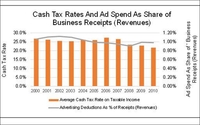Commentary
A Taxing Argument On Ad Deductions
- by Brian Wieser , January 13, 2014

Trade associations related to the advertising industry have become vocal in recent weeks in response to Congressional proposals -- from both the Democratic Senate Finance
Committee Chair and the Republican Chair of the House Ways and Means Committee -- that would alter rules surrounding the tax deductibility of advertising. Advertising is typically deducted during the
period during which spending occurs, allowing for an immediate reduction in potential tax obligations. However, the proposals under consideration contemplate allowing immediate deductions for only
half of conventional advertising in the year that expenses are incurred with the remainder capitalized, amortized and deducted over five- or ten-year periods.
Their arguments suggesting that tens of millions of jobs and trillions of dollars of economic activity are at risk strike me as hyperbole, because taxes do not have a noticeable impact on advertising budgets across the economy. Competitive intensity in a given category is more important, and most advertisers budget for advertising because doing so is better than the alternative of not doing so -- especially in industries where advertising impacts category share changes. Nonetheless, I was curious to see what we might quantify as the real impact on the advertising economy.
advertisement
advertisement
Using the most recent data from the Internal Revenue Service, we can see that the average cash tax rate on taxable income paid by U.S. corporate taxpayers amounted to 21.7% of total revenue. This rate was well below levels observed during the previous decade, which were as high as 27.3% in 2006. At the same time, advertising deductions as a percentage of business receipts generally declined. So at least over the prior decade, it would seem that lower tax rates were actually met with lower ad-spending levels. While we can point to years where taxes rose and spending intensity declined, we can also point to periods where cash tax rates rose, as was the case between 2005 and 2006, and ad spending was essentially flat as a percentage of receipts.
As we suggest above, other factors related to the composition of companies in the economy probably has a bigger impact on driving advertising trends. Furthermore, it is possible that direct-response marketers who already capitalize their current period ad spending and amortize those expenses over time (per existing tax rules as we understand them) to match the creation of a provable customer associated with ad spending account for a growing share of the advertising economy as captured in the IRS' data sets.
So overall, it seems unlikely to us that changes to the tax code such as those which are contemplated will have a noticeable impact on media owners' ad revenues. But the tax bite will still hit, and it will likely be marketers who will pay (and thus we can imagine their interests in defeating any bill which might raise the taxes they pay). The tax change would probably hit larger marketers disproportionately: approximately 2,200 companies account for almost 60% of total advertising deductions.
To illustrate the impact of the proposed tax changes, in 2010, the IRS estimated $202 billion in advertising deductions, and $1.021 trillion of income subject to income tax. If half of the $202 billion were to have been added back to taxable income and we used the 21.7% cash tax rate that was realized for the year, we would calculate $244 billion in taxes collected rather than the $222 billion that were actually collected. This amount would still have been far less than the taxes collected in 2005, 2006 and 2007, all of which were still pretty good years for advertising.
So while I do see an impact for marketers -- in 2010 this would have amounted to approximately 0.1% of business receipts, or 10% of actual ad spend for every marketer -- it would seem unlikely to have any meaningful effect on the companies by itself. Still, there is probably good reason to focus Congress on the appropriateness of altering the tax treatment for the marketers who pay for advertising vs. the other sources of revenue they might pursue. Toward this end, perhaps the better strategy for might lie in focusing on broader tax reform across the entire tax code rather than simply fighting against this single initiative. After all, marketers are skilled at selling products to consumers; perhaps they could be equally good at selling ideas to Congress.



There's a good case to be made for your point of "perhaps the better strategy for (reform) might lie in focusing on broader tax reform across the entire tax code." Part of the reason is the impossibility of efficiently implementing this particular tax code complication.
http://rusholson.blogspot.com/2013/12/defining-advertising-bridge-to-nowhere.html
Rush hits the issue on the head. How in the wide-wide world of sports are you going to tax advertising? That would be like trying to tax a smell, or conversation. The logistics and the eternal bickering over how, what, when and where to tax advertising would cost considerably more than such a tax would generate. Ask Florida. It tried this about 20 years ago and gave up the effort almost immediately. If it's revenue you want, adjust income tax rates.
And what is advertising? Stuff you run on a TV station or magazine ads, but is the money spent to hire people to handle twitter feeds and facebook posting advertising or just plain employees? And what happens if the advertiser raises their price the offers a rebate later? My understanding is that rebates are not taxable and don't even have to be reported.